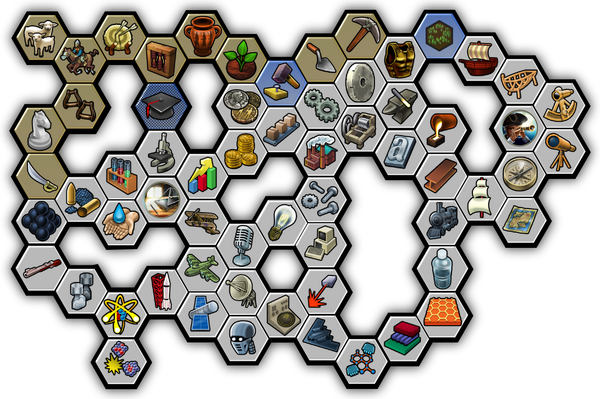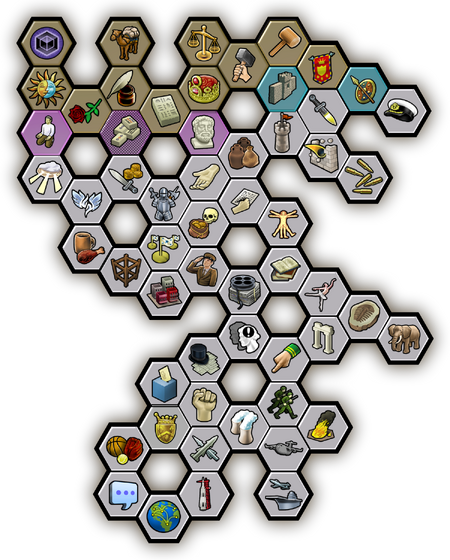For all the discussions about unique tech trees, I think we are facing a major problem, which is the very design of a tech tree.
I began to dislike it. Let's face it, it's completely ahistorical. Some prerequisites are simply untrue (you don't need to have money to decide to discover mathematics, and why would animal husbandry predate necessarily archery?). It's clearly based upon the eurocentric advancement of kowledge and technology, and even by those standards it's quite clumsy.
I hope for a complete overhaul on how scientific and sociological discoveries are made in 4X games, and I already thought of something:
Each "technology" would be kind of available right of the beginning, but unknown (like in the shuffle tech/civic trees). Each techology would exist in three states: unknown (you absolutely don't know what it is), mastered (you "discovered" it in the 4X game, so you enjoy the bonuses it gives) and known (you know the tech exist, but you haven't researched it yet). To go from "unknown" to "known", it would be based upon what is around you. If you have a lot of wild animals around you, the technology "animal husbandry" would probably goes from "unknown" to "known" because some guys in your empire would think "hey, wouldn't it be neat if we had control over those animals?".
Each technology would have, each turn (or each time limit for non-turn based 4X games), a chance to be mastered. This chance would be between 0 and 100% (no chance at all vs you're certain to master it the next turn/time unit).
The science output would not be beckers that fill a bigger becker than, when full, discover/master you a tech. It would just increase the chance of all (or some) techs to be mastered.
But this system would be very dynamic with how you play and your environment, not unlike how Eurekas and Inspirations work. For example, having access to the sea or a river would increase the chance of sailing techs to be discovered. Lots of things would help this way: mastering Chemistry would enhance the chances of discovering medical-related techs; having some stables would enhance your chances of discovring gunpowder. Having neighboring civs that have mastered the tech would also increase your chances, especially if you do some trade.
Important notes: a technology doesn't need to be "known" to be mastered. It would be like serendipity, or the discovery of quantas: nobody knew they existed before discovered them (unlike atoms, where the theory existed long before we prooved they exist).
Of course, we won't get rid completely of the prerequisites. The techs at the end of the tree would be very difficult to master, and might not give you any bonus at this moment (like discovering nuclear physics in the Bronze Age would be of no help). For example, to master Physics, Mathematics would be a prerequisite (meaning that without mathematics, physics will always have a 0% chance of being discovered).
Of course, to not let this completely passive, you'd have ways to influence your scientific research. First, building "science related" buildings would naturally increase the potential of discovering new techs. It can be pondered though: having a library would help you master mathematics and astronomy, but libraries aren't enough for high-tech technologies like nuclear physics for example. Once the "scientific method" mastered, you could also decide to focus your scientific efforts on one specific known technology, which would then greatly increase the chances of mastering it (at a money cost maybe). You could also finance "fundamental research" which does not focus on mastering a specific technology, but will increase the chances of unknown tech to become known.
I see a lot of advantages of this system. It's not just anymore a "fill your becker with smaller beckers until it's full, rince and repeat", you'd need to have actual strategies to got through the tech tree. How your expand your empire would have a direct impact, not just the numer of cities you plopped anywhere to have a new scientific district. It would also be more historical: a civ/faction in the mountains might not need to discover the wheel, but they will know how to build bridges much earlier since they need them to cross canyons and mountains. A completely inland empire would not have to research the completely useless Shipbuilding technology to be able to build buttress. Nomadic factions would laugh at irrigation, but would need animal husbandry and archery much earlier. You could discover writing without having the faintest idea what a pottery is, which (while not necessarily historical) could be feasible and should be feasible. Astronomy wouldn't be locked behind seafaring.
Each playthrough would be different, and really unique, reflecting the way you play. I don't know what you think about it, but I personally think that the tech tree model is old and it's great time we challenge it a little.





 )
)